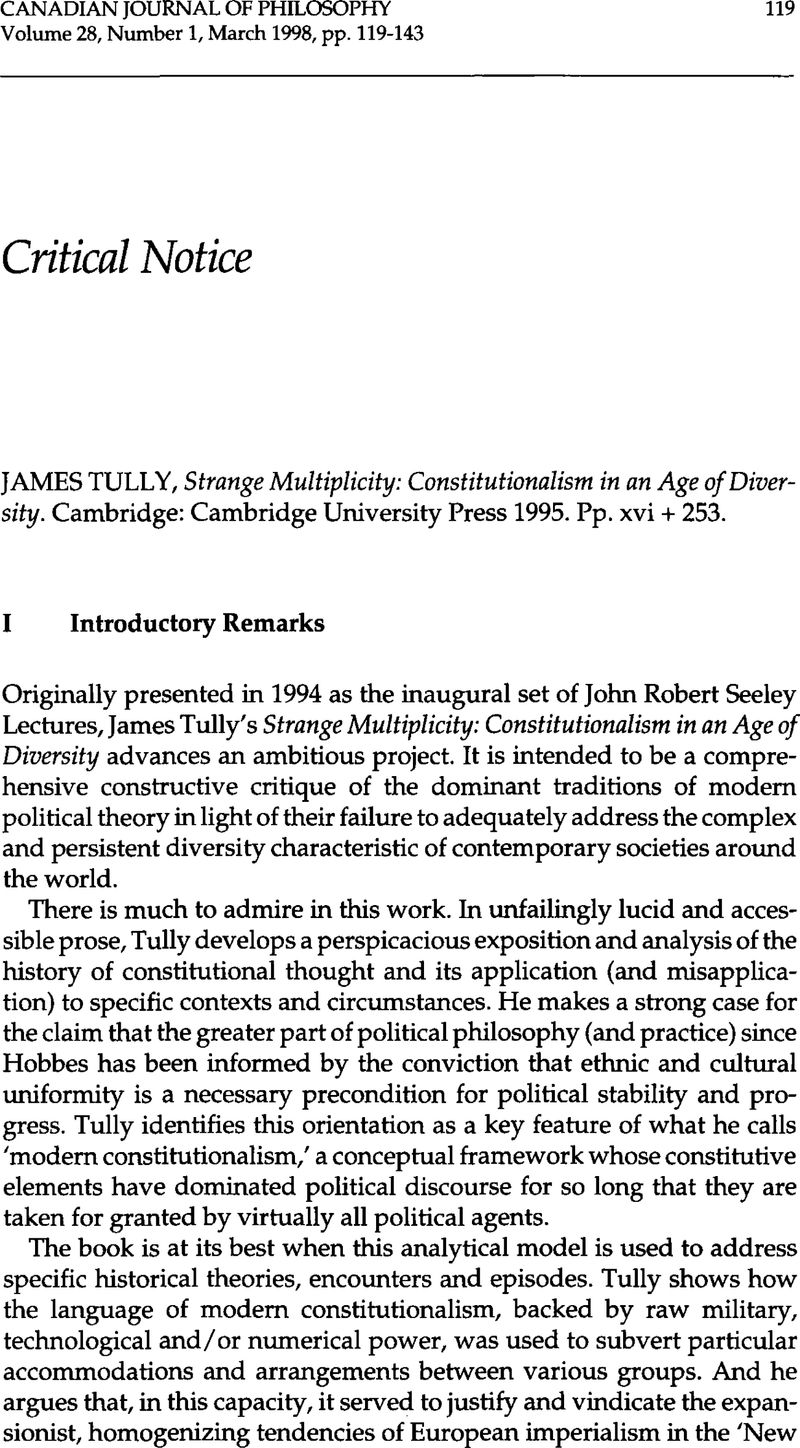Published online by Cambridge University Press: 01 January 2020

1 The development of an impressive literature on multiculturalism and pluralism may suggest that Tully's account has been overtaken and superseded by writers who have been prepared to explore the possibility that correction or refinement of existing theories can contribute to the satisfactory management of political diversity. For a very useful bibliography see Kymlicka, Will and Norman, Wayne ‘Return of the Citizen: A Survey of Recent Work on Citizenship Theory,’ Ethics 104 (1994) 378-81CrossRefGoogle Scholar. See also Kymlicka, Will ed., The Rights of Minority Cultures (Oxford: Oxford University Press 1995)Google Scholar.
2 One gets the flavor of this kind of process from the discussions surrounding recent proposals to amend Canada's constitution: the Meech Lake Accord, 1987, and the Charlottetown Proposal, 1992. Many of the groups that Tully focuses on sought and received constitutional recognition in these documents. But when the proposals were submitted to referendum approval, they were soundly defeated. Contractarian methodology failed, in this instance, to produce a constitution satisfactory to all the actors.
3 See Lloyd, Genevieve The Man of Reason (Minneapolis: University of Minnesota Press 1984)Google Scholar and Okin, Susan Moller Women in Western Political Thought (Princeton: Princeton University Press 1979)Google Scholar, for persuasive analyses of the history of the concept of rationality.
4 Hobbes, Thomas Leviathan, Tuck, Richard ed. (Cambridge: Cambridge University Press 1991)Google Scholar, ch. 29
5 Kymlicka, Will Multicultural Citizenship (Oxford: Oxford University Press 1995), 11ffGoogle Scholar.
6 Kymlicka, Will Liberalism, Community and Culture (Oxford: Clarendon Press 1989), 162-81Google Scholar
7 Nozick, Robert Anarchy, State and Utopia (New York: Basic Books 1973)Google Scholar
8 Gauthier, David Morals by Agreement (Oxford: Oxford University Press 1986)Google Scholar
9 Rawls, John ‘Justice as Fairness: Political not Metaphysical’ Philosophy and Public Affairs 14 (1985) 223-51Google Scholar. It is a matter of some debate whether or not the orientation announced in this article is faithful to, or divergent from, that found in Rawls's, A Theory of Justice (Cambridge: Harvard University Press 1971)Google Scholar.
10 Rawls, John Political Liberalism (New York: Columbia University Press 1993)Google Scholar
11 Some recent symposia on Rawls's, Political Liberalism are these: Pacific Philosophical Quarterly 75 (1994)Google Scholar; and Columbia Law Review 94 (1994) 1813-1949.
12 Milde, Michael ‘The Natural History of Overlapping Consensus,’ Pacific Philosophical Quarterly 76 (1995) 142-58CrossRefGoogle Scholar
13 Citing Hale, Matthew Reflection by the Lrd. Chiefe Justice on Mr. Hobbes his Dialogue of the Lawe, in Holdsworth, W.S. ed., A History of English Law 7 Vols. (Boston: Little Brown 1924), vol. V, 500-18 and 501-6Google Scholar
14 It should be pointed out that the case-by-case reasoning associated with Matthew Hale and the common law tradition is made simpler, if not possible, by a variety of background beliefs, legal precedents and a framework of positive, statute law which are shared by the participants to the proceedings.
15 Taylor, Charles ‘Atomism’ and ‘What's Wrong with Negative Liberty,’ in his Philosophy and the Human Sciences: Philosophical Papers 2 (Cambridge: Cambridge University Press 1985) 185–229CrossRefGoogle Scholar. Also see Taylor, Charles ‘Cross-Purposes: The Liberalism-Communitarianism Debate,’ in Rosenblum, N. ed. Liberalism and the Moral Life (Cambridge: Harvard University Press 1989) 159–182Google Scholar
16 Moore, Margaret Foundations of Liberalism (Oxford: Clarendon Press 1993)CrossRefGoogle Scholar; see esp. ch. 7, where Moore develops a clearly anti-conservative, dynamic program for communitarianism.
17 This is a constant theme inK yrnlicka’ s work, but see especially Kyrnlicka, Liberalism, Community and Culture, 162-81Google Scholar
18 Buchanan, Allen ‘Assessing the Communitarian Critique of Liberalism,’ Ethics 99 (1989) 852-82CrossRefGoogle Scholar
19 Indeed, it seems that there would be little reason to expect mutual recognition to develop between political groups that were anything less than equal in political power.